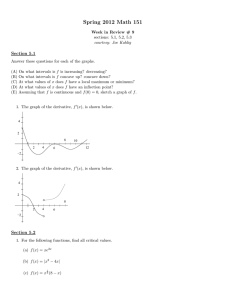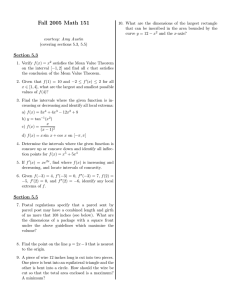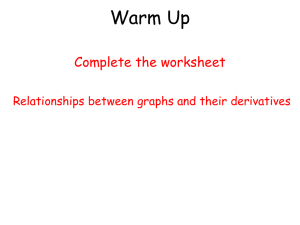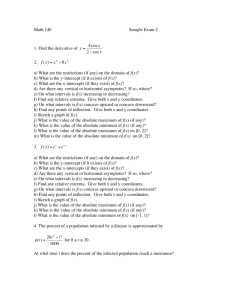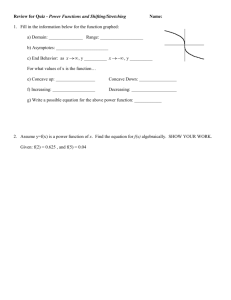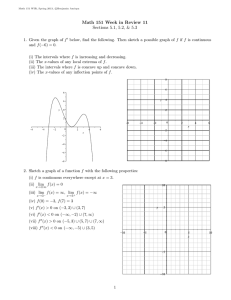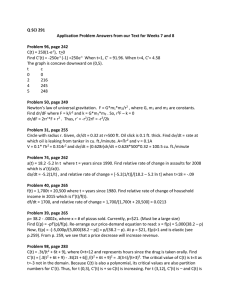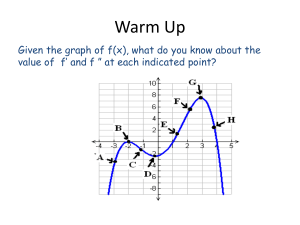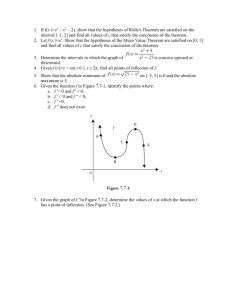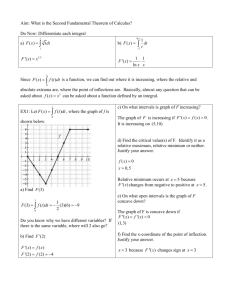Calculus Practice: Critical Numbers & Extrema
advertisement
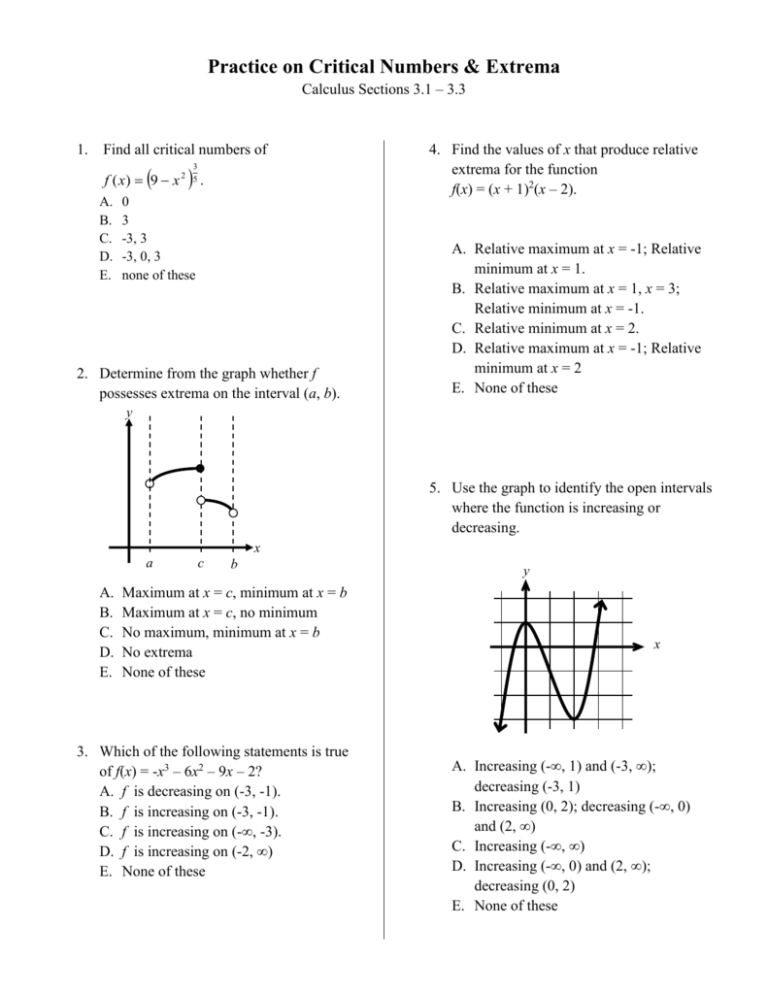
Practice on Critical Numbers & Extrema Calculus Sections 3.1 – 3.3 1. Find all critical numbers of f ( x) 9 x A. B. C. D. E. . 3 2 5 0 3 -3, 3 -3, 0, 3 none of these 2. Determine from the graph whether f possesses extrema on the interval (a, b). 4. Find the values of x that produce relative extrema for the function f(x) = (x + 1)2(x – 2). A. Relative maximum at x = -1; Relative minimum at x = 1. B. Relative maximum at x = 1, x = 3; Relative minimum at x = -1. C. Relative minimum at x = 2. D. Relative maximum at x = -1; Relative minimum at x = 2 E. None of these y 5. Use the graph to identify the open intervals where the function is increasing or decreasing. x a A. B. C. D. E. c b Maximum at x = c, minimum at x = b Maximum at x = c, no minimum No maximum, minimum at x = b No extrema None of these 3. Which of the following statements is true of f(x) = -x3 – 6x2 – 9x – 2? A. f is decreasing on (-3, -1). B. f is increasing on (-3, -1). C. f is increasing on (-∞, -3). D. f is increasing on (-2, ∞) E. None of these y x A. Increasing (-∞, 1) and (-3, ∞); decreasing (-3, 1) B. Increasing (0, 2); decreasing (-∞, 0) and (2, ∞) C. Increasing (-∞, ∞) D. Increasing (-∞, 0) and (2, ∞); decreasing (0, 2) E. None of these 8. What is the sign of the second derivative of f at the indicated point? 8 6. If f ( x ) , which statement is correct? x A. The graph of f is concave up on the interval (0, ∞). B. The graph of f is concave up on the interval (-∞, 0). C. The graph of f is concave down on the interval (-∞, 0) D. The graph of f is concave up on the interval (-∞, ∞). E. None of these y x A. B. C. D. E. 7. Find all points of inflection of the function f(x) = x4 + x3. 1 1 A. (0, 0) and , 2 16 Positive Negative Zero The sign cannot be determined None of these 1 1 B. , 2 16 C. (0, 0) 27 3 D. (0, 0) and , 4 256 E. None of these 3 9. Use a graphing calculator to graph f ( x) x 5 . Use the graph of f to determine the open intervals where the graph of f is concave upward or concave downward. 10. Find the critical numbers of f(x) = x3 – 12x2. 11. Find the minimum and maximum values of f(x) = x2 – 2x + 1 on the interval [0, 3]. 12. Find the open intervals on which f ( x) 1 is increasing or decreasing. x2 13. Find the relative minimum and relative maximum for f(x) = 2x3 + 3x2 – 12x. 14. Let f(x) = x4 – 4x3 + 4x2 + 1. Respond to each part below. a. Find all critical numbers of f. b. Find the intervals over which f is increasing or decreasing. c. Locate relative extrema of f using the first derivative test. d. Find the y-intercept of f. e. Sketch the graph of the curve. 15. Find the intervals on which the graph of the function f(x) = x4 – 4x3 + 2 is concave upward or concave downward. Then find all points of inflection for the function. 16. The graph of a polynomial function, f, is given. On the same coordinate axes, sketch f ′ and f ″. y x Calculus Practice: 3.1-3.4 1. Find the absolute extrema in each interval. a) f(x) = x3 – 12x on [0, 4] c) e) b) h(t ) t on [3, 5] t2 d) 2 x 2 , 1 x 3 on [1, 5] f ( x) 2 3x, 3 x 5 2. Use your understanding of each theorem to respond to each prompt. a) Sketch a function which is continuous on [a, b] b) The Mean Value Theorem states: If f is where Rolle’s Theorem does not apply. continuous on [a, b] and differentiable on (a, b), then there exists a number, c, in (a, b) such that… f ′(c) = a b 3. Find the value of c guaranteed by Rolle’s Theorem. If no such value exists, explain why not. 6x b) f ( x) 3 x 3 on [0, 6] a) f ( x) 4 sin 2 x on 0, 6 4. Find the value of c guaranteed by the Mean Value Theorem. If no such value exists, state why not. f ( x) x2 on [2, 6] 5. Find all critical numbers and intervals where the function is increasing. x3 a) f(x) = x4 – 32x + 4 c) h(x) = x4 – 2x3 b) g ( x) 3 x 6. Find all inflection points and intervals where the function is concave upward. a) f(x) = 5 + 3x2 – x3 b) g ( x) x 2 1 c) h(x) = sin x + cos x where 0 < x < 2π
